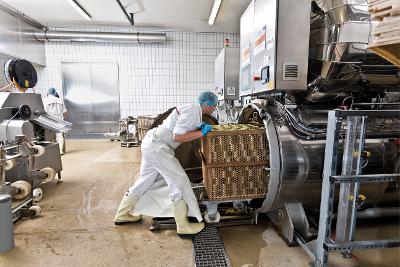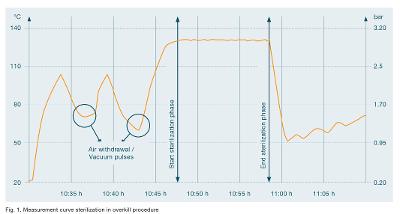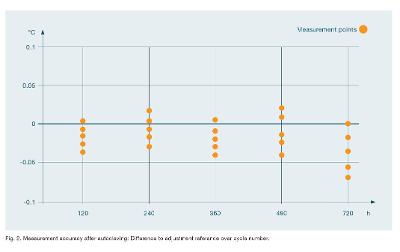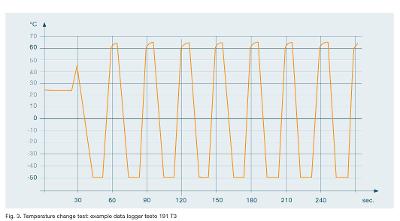Users asked us: How can it be ensured that the testo 191 data loggers are able to meet the demands of the food industry? After all, pasteurization, sterilization and freeze-drying are among the toughest areas of application to which data loggers are subjected.
Our response is a series of endurance tests which not only simulate practical application conditions, but with regard to the demands placed on the loggers, actually exceed them. From talking to customers, we know: There are three pain points which lead to dissatisfaction with the data loggers available on the market. These relate to the robustness of the loggers, the accuracy drift and the reliability of the batteries.
We examined all three customer requirements in application tests. And these are the results.

1. How robust are the testo 191 data loggers?
Our demands.
As regards robustness, we made it our objective that the testo 191 data loggers should not only repeatedly withstand the various procedures in autoclaves and freeze-drying plants, but also be readable in unaltered form over a longer period.
This means: The loggers have to prove their ability to function in a temperature range from -50 °C (freeze-drying) to +140 °C (steam sterilization). They are additionally exposed to pressure conditions of 50 mbar in freeze-drying and up to 4 bar in sterilization.
How did we do the test?
In order to ensure that the testo 191 data loggers can withstand the conditions in the temperature and pressure ranges, we conducted two test series, each simulating an extreme scenario.
Test case 1:
Steam sterilization with overkill procedure
The term “overkill procedure” refers to a sterilization procedure with two pre-vacuum cycles and a sterilization temperature of 134 °C. Due to the high temperatures, the water vapour and the vacuum pulses, the data loggers used are subject to an enormous burden, which can lead to untightness or malfunction. The one-hour sterilization process was carried out multiple times with the same loggers under these extreme conditions.
The result.
The testo 191 data loggers withstood the one-hour steam sterilization process at 134 °C over 2000 times – and were subsequently still fully functional.
Test case 2:
Freeze-drying
In common freeze-drying processes, the burdens placed on the data loggers are different. In this case, it is in particular the combination of below-zero temperatures and temperature changes which cause difficulties for many loggers. This is why, for the purposes of the freeze-drying application, the testo 191 data loggers were tested for stability down to -50 °C in a deep-freezer. Apart from this, the data loggers were subjected to a temperature change test at temperatures from -50 °C to +70 °C.
The result.
The testo 191 data loggers withstood the temperature change tests and measurements in deep-freezers over 750 hours without malfunction – and were subsequently fully functional.

2. Is it true that the testo 191 data loggers only need to be calibrated once a year?
Our demands.
In the practical application of data loggers, it is usual to carry out a comparative measurement at regular intervals, in order to identify possible accuracy drift early and to counteract it with a calibration. Because this procedure costs our customers valuable time in their daily work, we developed the testo 191 data loggers with the objective of allowing Testo customers to dispense with constant pre- and post-adjustments of the loggers.
How did we do the test?
In order to prove the accuracy drift, the data loggers were tested in a one-hour overkill procedure in the autoclaves.
At intervals of 60 autoclaving cycles, the data loggers were removed from the autoclaves and placed in an adjustment bath. The data loggers were tested at the temperature points -50 °C, -20 °C, 0 °C, 50 °C and 120 °C, in order to determine an accuracy deviation from the reference instrument.
The result.
Even after 750 hours of operation, the testo 191 data loggers kept their specified accuracy of ±0.1 °C for the temperature data loggers and ±20 mbar for the pressure loggers. In other words: An annual calibration, as recommended by Testo, is absolutely sufficient. Regular pre- and post-adjustment of the loggers can be dispensed with.

3. Does the battery concept hold up under test conditions?
Our demands.
A frequent requirement was initially to find a battery type which ensures a reliable supply of the loggers not only in the low (-50 °C) but also in the high (+140 °C) temperature ranges. Apart from this, we wanted to ensure that the user only needs to replace the battery once a year. Since the complicated replacement of the battery is one of the most common sources of error in the use of data loggers, battery replacement also needed to be carried out safely, quickly and easily.
How did we do the test?
In order to test whether the battery concept of the testo 191 data loggers meets these requirements, we tested threefold.
|
Test case 1:
|
Test case 2:
|
Test case 3:
|
|
Autoclave cycle test
|
Freeze-drying test
|
Temperature change test
|
| The batteries were tested over several hundred hours in the autoclaving process at +134 °C. In the course of this, the batteries were exposed to high temperatures, extreme pressures and water vapour. |
The batteries were intensively tested over several hundred hours in deep-freezers at -50 °C. The challenge for the batteries was to be able to withstand low temperatures and a deep vacuum. |
The batteries were also tested in temperature change tests at temperatures from -50 °C to +70 °C. The test was to examine whether the batteries withstood extreme temperature fluctuations. |
The result.
The test series and their ambient conditions placed an extreme burden on the battery. However, it was clearly shown that the battery of the testo 191 can be used without concern in the defined temperature range. This was confirmed by the Fraunhofer Institute in its assessment: “Neither cell type1 displayed any safety-critical behaviour over the course of several hours at temperatures <150°C during the tests conducted, even when an external short circuit was carried out.” 2

Conclusion.
The testo 191 data loggers all passed our extreme tests with flying colours. For you as a user, that means you can be assured:
- That the testo 191 data loggers are able to withstand without any problems even extreme demands such as those occurring in freeze-drying or in the overkill procedure.
- That the testo 191 data loggers only need to be calibrated once a year.
- That the innovative and user-friendly battery concept of the testo 191 data loggers has easily passed the battery stress test – officially confirmed by the Fraunhofer Institute.

Find out more about the testo 191 data loggers at www.testo.com or from your personal Testo contact partner.
Comments.
1 The battery concept of testo 191 covers two types of primary cells: SL-550 Tadiran (-55 °C to +130 °C) and BR1225A Panasonic (-40 °C to +125 °C).
The Fraunhofer Institute tested whether these primary cells also withstand the larger thermal burden of steam sterilization and freeze-drying.
2 Fraunhofer Institute for Chemical Technology ICT: Temperature durability test for primary cells. Result report (status 04.12.2018) p. 23: We are happy to send you the complete report.
Testo South Africa (Pty) Ltd
1 Glen Eagles Office Park
Cnr. Braambos & Monument Rd.
Glen Marais 1619
Kempton Park, South Africa
Contact number : +27 11 380 8060
Email : info@testo.co.za










